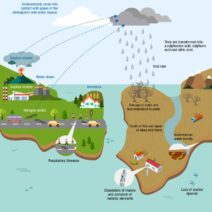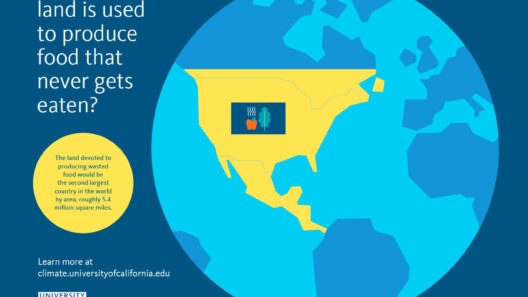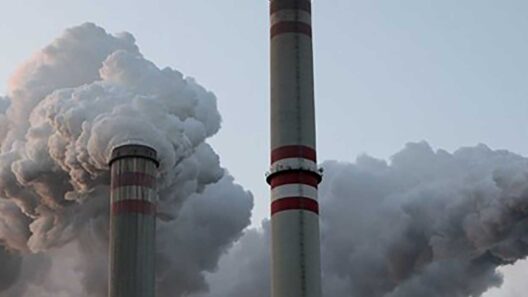Climate change is no longer a distant threat; it is an immediate and palpable reality affecting our lives profoundly. Whether through extreme weather events, rising sea levels, or deteriorating public health, the effects of a changing climate are practically ubiquitous. Understanding how climate change intricately weaves into the fabric of daily existence can elucidate its significance and the urgency of addressing it today.
One of the most perceptible manifestations of climate change is the escalation of extreme weather conditions. The phenomenon, marked by increased frequency and intensity of storms, floods, heatwaves, and droughts, has become a common observation in many regions. For instance, the National Oceanic and Atmospheric Administration (NOAA) has documented a rise in the occurrence of severe storms by over 50% in the last three decades. These climatic upheavals not only trigger immediate damage but also elicit long-term economic repercussions, thus demonstrating that climate change is inextricably linked to the stability of livelihoods.
Additionally, these extreme events exponentiate vulnerabilities within specific communities. Low-income neighborhoods often bear the brunt of climate-related disasters due to a lack of adequate infrastructure and resources for recovery. Disproportionately impacting marginalized groups, climate change underscores profound societal inequities, thereby necessitating a multi-faceted response that acknowledges both environmental and social dimensions. This intersection of climate and social justice highlights a compelling facet of our contemporary struggle: the realization that climate change is not just an ecological issue, but a deeply entrenched socio-economic crisis.
The specter of rising sea levels looms large, threatening coastal regions and islands worldwide. As polar ice caps melt and ocean temperatures rise, the resulting inundation of shorelines not only displaces communities but also irrevocably alters ecosystems. The Union of Concerned Scientists predicts that by 2050, major cities such as Miami, New York, and New Orleans could experience chronic flooding. Such existential threats provoke questions about the future of urban centers and engender a sense of urgency for adaptive strategies. For instance, cities are exploring innovative infrastructure solutions such as seawalls and floating buildings to mitigate the impending risks, highlighting a resilience-driven response.
Further compounding the discourse on climate change is its impact on public health. Rising temperatures contribute to an uptick in heat-related illnesses, exacerbating chronic conditions such as asthma and cardiovascular disease. The Centers for Disease Control and Prevention (CDC) has identified climate change as a direct threat to the efficacy of public health systems. Moreover, the proliferation of vector-borne diseases, such as West Nile Virus and Zika, illustrates how shifting climatic conditions enable mosquitoes to thrive in formerly uninhabitable regions, posing new health hazards. This convergence of climate and health exemplifies a profound concern: our well-being is inextricably linked to the health of our planet.
Moreover, the psychological ramifications of climate change are increasingly recognized within the scientific community. The term “eco-anxiety” has entered the zeitgeist, reflecting a pervasive sense of helplessness and dread regarding the catastrophic consequences of ecological degradation. Individuals grapple with feelings of despair and uncertainty, emblematic of the broader existential crises faced by generations. This mental health dimension adds layers of complexity to the conversation about climate change and underscores the need for comprehensive approaches that prioritize both environmental sustainability and emotional resilience.
The agricultural sector is yet another arena profoundly influenced by climate change, affecting food security and production. Altered precipitation patterns, prolonged droughts, and shifting growing seasons significantly challenge traditional farming practices. Crop yields in many regions are projected to diminish, directly impacting food availability and prices. Notably, staple crops such as wheat and corn are particularly vulnerable to rising temperatures, which engenders a precarious situation where food production struggles to meet increasing global demand. This nexus between climate change and agriculture not only highlights the necessity of sustainable practices but also calls for systemic shifts in policy to support adaptive strategies that can buffer against changing environmental conditions.
Governments and organizations worldwide are recognizing these multifaceted challenges, showcasing an increasing commitment to address climate change comprehensively. The Paris Agreement exemplifies a global effort to limit temperature rise and fundamentally reshape our approach to environmental stewardship. The accord aims to forge pathways toward sustainability, emphasizing the importance of collaboration among nations, industries, and communities. Transitioning towards renewable energy sources, enhancing energy efficiency, and investing in carbon capture technologies are pivotal strategies embraced by this global movement.
Every individual bears a role in mitigating climate change, forging a pathway to a more sustainable future. Personal choices, such as reducing energy consumption, opting for public transportation, or embracing a plant-based diet, contribute meaningfully to the broader tapestry of climate action. Moreover, advocating for systemic change, whether through political engagement or community initiatives, empowers individuals to influence decision-makers and catalyze progress. Such collective action harnesses the potency of grassroots movements, fostering a culture of awareness and responsibility.
In conclusion, the realities of climate change are not abstract; they are tangible forces shaping our lives in myriad ways. From the extreme weather events that disrupt daily routines to the long-term threats to food security and public health, the implications are profound and likely to escalate without concerted action. As we grapple with the complexities of climate change, it remains crucial to transcend the notion of isolation and acknowledge our shared responsibility. Understanding that climate change is a collective challenge enables a unified approach to address it. Ownership of these shared challenges will create a more resilient future, ensuring that we not only survive but flourish in harmony with our planet.




